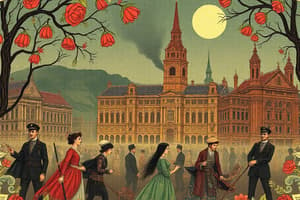Podcast
Questions and Answers
When did World War I begin?
When did World War I begin?
- 1905
- 1945
- 1914 (correct)
- 1939
Which country declared war on Serbia to start World War I?
Which country declared war on Serbia to start World War I?
- Russia
- Austria-Hungary (correct)
- Italy
- Germany
What event led America to join World War II?
What event led America to join World War II?
- Russia's alliance with Germany
- Italy's attack on Britain
- Germany's invasion of France
- Japan's attack on Pearl Harbor (correct)
Which conflict involved alliances between European nations?
Which conflict involved alliances between European nations?
What were some key causes of World War I?
What were some key causes of World War I?
Which war led to an increase in women's rights and political involvement?
Which war led to an increase in women's rights and political involvement?
What were some key factors contributing to the outbreak of World War II?
What were some key factors contributing to the outbreak of World War II?
How did World War II impact the development of new technologies?
How did World War II impact the development of new technologies?
Why do the consequences of World War II still play a role in shaping our modern world?
Why do the consequences of World War II still play a role in shaping our modern world?
Which event significantly reduced German strength following World War I?
Which event significantly reduced German strength following World War I?
How did new mass media techniques influence public opinion during World War II?
How did new mass media techniques influence public opinion during World War II?
Flashcards are hidden until you start studying
Study Notes
In history, World Wars I and II stand out as two of the most significant conflicts ever fought by humanity. These global conflicts had profound impacts across multiple dimensions—politically, economically, socially, technologically, culturally, diplomatically, and militarily.
World War I began in 1914 when Austria-Hungary declared war on Serbia after an assassination attempt on Archduke Franz Ferdinand. It was a major conflict involving alliances between European nations, including Germany, France, Russia, Britain, Italy, and many more. The war lasted from 1914 until 1918, claiming millions of lives and leaving Europe devastated. Some key causes were imperialism, militarism, nationalism, and alliance systems. This war also led to great changes such as an increase in women's rights and political involvement during wartime, technological advancements like tanks and airplanes, and new forms of government like communism in Soviet Russia.
World War II followed closely behind, starting with the invasion of Poland by Germany in September 1939. Japan attacked Pearl Harbor in December 1941, causing America to join the fight against the Axis powers of Germany, Japan, and Italy. Unlike WWI, this war involved much larger amounts of territory and resources, largely due to newly available military technology. Key factors contributing to the outbreak included rising tensions in international relations, fascist regimes taking power, and the Treaty of Versailles which reduced German strength significantly following World War I. During WWII, there was widespread violence over several years, technological advances including nuclear weapons, new mass media techniques used to influence public opinion, and significant economic restructuring.
These two events continue to have far-reaching effects even today. They shaped many aspects of life for generations to come; they influenced the development of new technologies and changed how countries interacted with each other politically, socially, and economically. Even though these conflicts ended some time ago, their consequences still play a role in shaping our modern world.
Studying That Suits You
Use AI to generate personalized quizzes and flashcards to suit your learning preferences.




